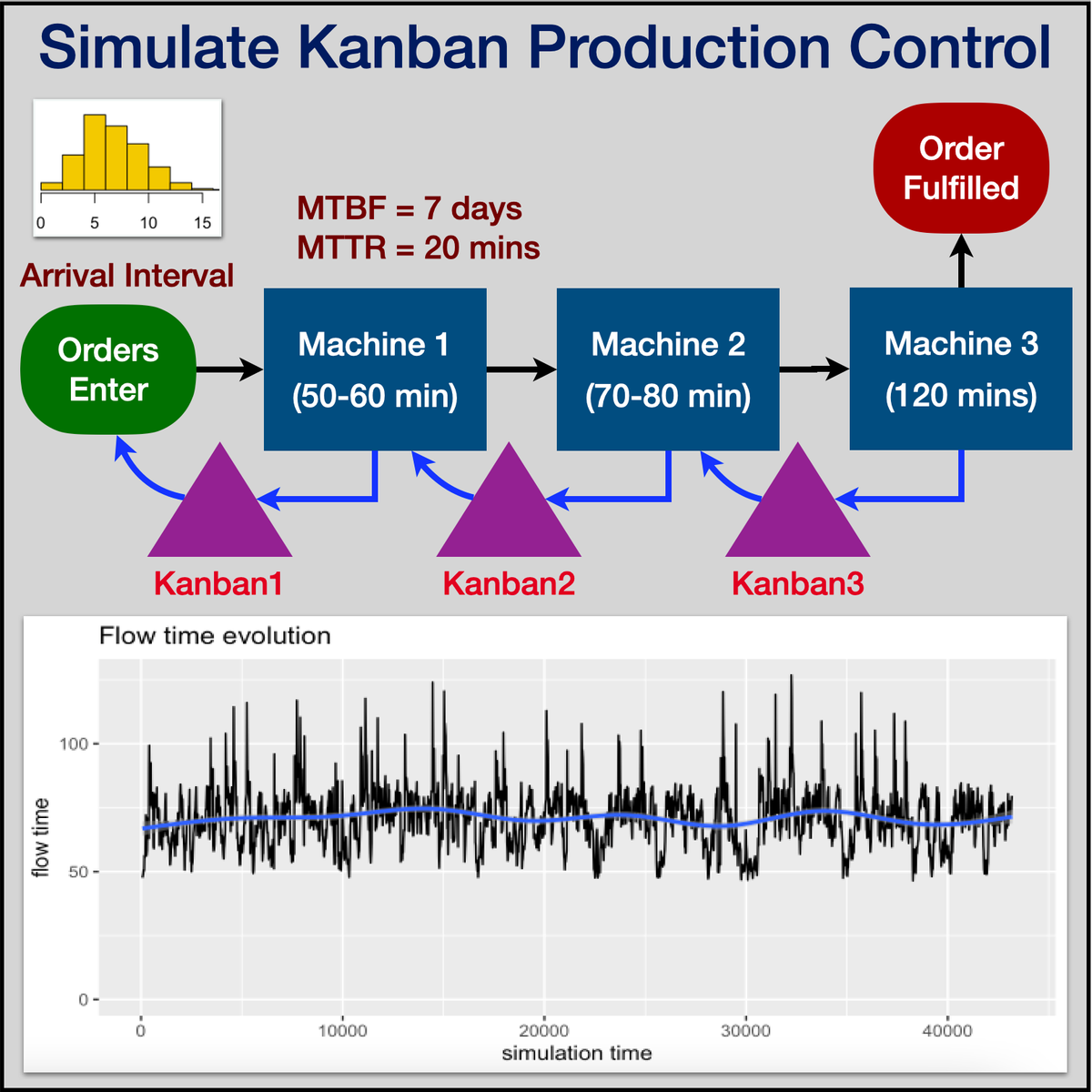
Understand Kanban Production Control
Model Discrete Event Simulations Using R Simmer
Capture Simulation Data, Plot Charts & Interpret Results
What's inside
Syllabus
Good to know
Save this course
Activities
Review Kanban Fundamentals
Show steps
Refresh your understanding of Kanban principles and methodologies to build a solid foundation for the course.
Browse courses on
Kanban
Show steps
-
Revisit books or articles on Kanban
-
Create a summary of key concepts
-
Discuss Kanban with colleagues or peers
Practice with R Simmer Package
Show steps
Enhance your proficiency in using R Simmer package to prepare for the simulation tasks in the course.
Browse courses on
Discrete Event Simulation
Show steps
-
Follow online tutorials on R Simmer
-
Experiment with sample simulations
-
Build a simple simulation model
Create a Visual Guide to Kanban Production Control
Show steps
Create a visual representation of Kanban production control to enhance your understanding and recall of its principles.
Browse courses on
Production Control
Show steps
-
Choose appropriate visualization tools or software
-
Design a visual representation of Kanban process
-
Share your visual guide with peers for feedback
Four other activities
Expand to see all activities and additional details
Show all seven activities
Mentor a Peer in Kanban Implementation
Show steps
Reinforce your learning by sharing your knowledge and helping others understand and implement Kanban principles.
Browse courses on
Mentorship
Show steps
-
Identify a mentee who seeks guidance in Kanban
-
Share your understanding and best practices
-
Provide support and feedback
Analyze Simulation Results and Interpret Data
Show steps
Practice analyzing simulation data and drawing meaningful conclusions to strengthen your understanding of simulation outcomes.
Browse courses on
Data Analysis
Show steps
-
Study statistical methods for analyzing simulation results
-
Conduct practice analysis on sample data sets
-
Interpret and present simulation findings
Participate in an Online Simulation Challenge
Show steps
Put your simulation skills to the test and learn from others in a competitive environment.
Browse courses on
Discrete Event Simulation
Show steps
-
Research online simulation challenges
-
Form a team or participate individually
-
Develop and optimize a simulation model
Contribute to an Open-Source Discrete Event Simulation Project
Show steps
Deepen your understanding of simulation techniques by contributing to and learning from an active open-source project.
Browse courses on
Open Source
Show steps
-
Identify suitable open-source projects
-
Read documentation and codebase
-
Make a code contribution or report an issue
Review Kanban Fundamentals
Show steps
Refresh your understanding of Kanban principles and methodologies to build a solid foundation for the course.
Browse courses on
Kanban
Show steps
- Revisit books or articles on Kanban
- Create a summary of key concepts
- Discuss Kanban with colleagues or peers
Practice with R Simmer Package
Show steps
Enhance your proficiency in using R Simmer package to prepare for the simulation tasks in the course.
Browse courses on
Discrete Event Simulation
Show steps
- Follow online tutorials on R Simmer
- Experiment with sample simulations
- Build a simple simulation model
Create a Visual Guide to Kanban Production Control
Show steps
Create a visual representation of Kanban production control to enhance your understanding and recall of its principles.
Browse courses on
Production Control
Show steps
- Choose appropriate visualization tools or software
- Design a visual representation of Kanban process
- Share your visual guide with peers for feedback
Mentor a Peer in Kanban Implementation
Show steps
Reinforce your learning by sharing your knowledge and helping others understand and implement Kanban principles.
Browse courses on
Mentorship
Show steps
- Identify a mentee who seeks guidance in Kanban
- Share your understanding and best practices
- Provide support and feedback
Analyze Simulation Results and Interpret Data
Show steps
Practice analyzing simulation data and drawing meaningful conclusions to strengthen your understanding of simulation outcomes.
Browse courses on
Data Analysis
Show steps
- Study statistical methods for analyzing simulation results
- Conduct practice analysis on sample data sets
- Interpret and present simulation findings
Participate in an Online Simulation Challenge
Show steps
Put your simulation skills to the test and learn from others in a competitive environment.
Browse courses on
Discrete Event Simulation
Show steps
- Research online simulation challenges
- Form a team or participate individually
- Develop and optimize a simulation model
Contribute to an Open-Source Discrete Event Simulation Project
Show steps
Deepen your understanding of simulation techniques by contributing to and learning from an active open-source project.
Browse courses on
Open Source
Show steps
- Identify suitable open-source projects
- Read documentation and codebase
- Make a code contribution or report an issue
Career center
Industrial Engineer
Manufacturing Engineer
Operations Research Analyst
Production Manager
Quality Assurance Manager
Process Improvement Specialist
Supply Chain Analyst
Logistics Manager
Transportation Manager
Warehouse Manager
Data Analyst
Statistician
Market Research Analyst
Financial Analyst
Actuary
Reading list
Share
Similar courses
OpenCourser helps millions of learners each year. People visit us to learn workspace skills, ace their exams, and nurture their curiosity.
Our extensive catalog contains over 50,000 courses and twice as many books. Browse by search, by topic, or even by career interests. We'll match you to the right resources quickly.
Find this site helpful? Tell a friend about us.
We're supported by our community of learners. When you purchase or subscribe to courses and programs or purchase books, we may earn a commission from our partners.
Your purchases help us maintain our catalog and keep our servers humming without ads.
Thank you for supporting OpenCourser.



